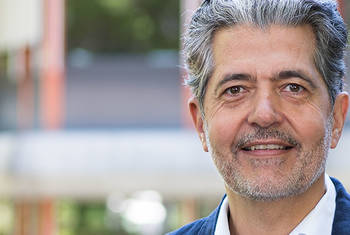Ralf Poscher How Can We Effectively Assess the Level of Surveillance in a Society?
Ralf Poscher is Managing Director of the Max Planck Institute for the Study of Crime, Security and Law where he is also Director of the Department of Public Law. Previously Dean of the Law faculty at the University of Freiburg, Poscher holds an honorary professorship at that institution. He has also held research professorships in the USA, Japan and France. Poscher’s main research interests include legal theory, constitutional law and national security law. The recipient of a Fernand Braudel Senior Fellowship from the European University Institute in 2013, Poscher is co-editor of the European Security Research Journal and a member of the Expert Council for the German Ministry for Education and Research on the integration of the social sciences and humanities in civil security research.
Area of Research
Comparative Law
since 2021
Managing Director
Max Planck Institute for the Study of Crime, Security and Law (more details)
since 2019
Honorary Professor
Albert Ludwigs University of Freiburg (Albert-Ludwigs-Universität Freiburg)
Faculty of Law
since 2019
Director
Max Planck Institute for the Study of Crime, Security and Law (more details)
Department of Public Law
2018-2019
Dean
Albert Ludwigs University of Freiburg (Albert-Ludwigs-Universität Freiburg)
Faculty of Law
2018
Guest Professor
Université de Lyon
Faculté de Droit
2015-2016
Rector’s Fellow
Albert Ludwigs University of Freiburg (Albert-Ludwigs-Universität Freiburg)
Freiburg Institute of Advanced Studies (FRIAS)
2013-2016
Managing Director
Albert Ludwigs University of Freiburg (Albert-Ludwigs-Universität Freiburg)
Centre for Security and Society
2009-2019
Director and Professor
Albert Ludwigs University of Freiburg (Albert-Ludwigs-Universität Freiburg)
Faculty of Law, Institute for Staatswissenschaft and Philosophy of Law, Department 2: Philosophy of Law
2004-2009
Professor
Ruhr University Bochum (Ruhr-Universität Bochum)
Faculty of Law, Chair of Public Law, Sociology of Law and Philosophy of Law
2002
Assistant Professor
Humboldt-Universität zu Berlin
Faculty of Law
1995-1999
Research Assistant
Humboldt-Universität zu Berlin
Faculty of Law, Institute for Public Law, Chair of Prof. Dr. Bernhard Schlink
1993-1995
Research Assistant
Humboldt University of Berlin (Humboldt-Universität zu Berlin)
Faculty of Law
1991-1992
Research Assistant
Goethe University of Frankfurt
Faculty of Law
1990-1991
Research Assistant
University of Bonn (Rheinische Friedrich-Wilhelms-Universität Bonn)
Faculty of Law
2012
Guest Researcher
Princeton University
Program: "Program in Law and Public Affairs",
2002
Habilitation
Humboldt University of Berlin (Humboldt-Universität zu Berlin)
Venia legendi for Public Law, Constitutional History and Philosophy of Law
1999-2002
Postdoctoral research fellow
Humboldt University of Berlin (Humboldt-Universität zu Berlin)
Faculty of Law, Institute for Public Law, Chair of Prof. Dr. Bernhard Schlink
1999
Doctorate
Humboldt University of Berlin (Humboldt-Universität zu Berlin)
Faculty of Law
1995
Second State Exam in Law
Humboldt University of Berlin (Humboldt-Universität zu Berlin)
1992-1993
Legal Clerkship
Superior Court of Justice, Berlin
1990
First State Exam in Law
University of Bonn (Rheinische Friedrich-Wilhelms-Universität Bonn)
1984-1990
Study of Law
University of Bonn (Rheinische Friedrich-Wilhelms-Universität Bonn)
Semesters Abroad at Université de Bourgogne, Dijon and London School of Economics
1983-1984
Study of Philosophy and German Studies
University of Hagen (FernUniversität in Hagen)
- IRZ (German Foundation for International Legal Cooperation)
- Max Planck Law
- German Section of the International Association for Law of Philosophy and Social Philosophy e.V.
- Association for Sociology of Law
- Law and Society Association
- Association of German University teachers for Constitutional Law
Fellowships
- Fernand Braudel Senior Fellow, European University Institute Florence, Department of Law, Legal Theory (2013)
- Appointment to the membership of Institute for Advanced Study, Princeton, USA (2007/2008)
Prizes
- Humboldt-Award, Humboldt-University of Berlin (1999)
- Second prize in the University Research Contest “Global Change”, Ruhr-University Bochum (2005)


Max Planck Institute for the Study of Crime, Security and Law
Freiburg, GermanyThe Max Planck Institute for the Study of Crime, Security and Law consists of three research departments: Criminology, Public Law, and Criminal Law. In the Department of Criminology, research is conducted into which individual predispositions and environmental factors cause people to commit a crime. To this end, long-term scientific studies are combined with behavioral experiments in the virtual reality world. The Department of Public Law deals with the law of public security. It investigates how the legal system can respond to dangers in order to prevent criminal offences and other damage. The Department of Criminal Law conducts research into the fundamentals of criminal law, prohibition norm, and criminal penalties in the context of globalization, migration, and the social and cultural fragmentation of societies. The Institute's focus is on basic research, as well as on application research due to its interdisciplinary legal, social science and psychological research approach.
Map
To what extent are security agencies accessing our communications and other data? In this video, RALF POSCHER proposes and explains a mechanism by which we can answer this question. Poscher outlines how we can go about constructing a surveillance barometer. This would reveal a society’s surveillance score based on the amount and the intensity of surveillance activities undertaken by security agencies. Providing helpful insight also for legislators and the general public, the barometer’s remit also has the potential to be extended to a supra-national level, e.g. the European Union.
LT Video Publication DOI: https://doi.org/10.21036/LTPUB10924
Entwicklung eines Periodischen Überwachungsbarometers für Deutschland: Pilotprojekt–Max-Planck-Institut zur Erforschung von Kriminalität, Sicherheit und Recht, Abteilung Öffentliches Recht, Freiburg i. Br.
- Ralf Poscher and Michael Kilchling
- Published in 2021








